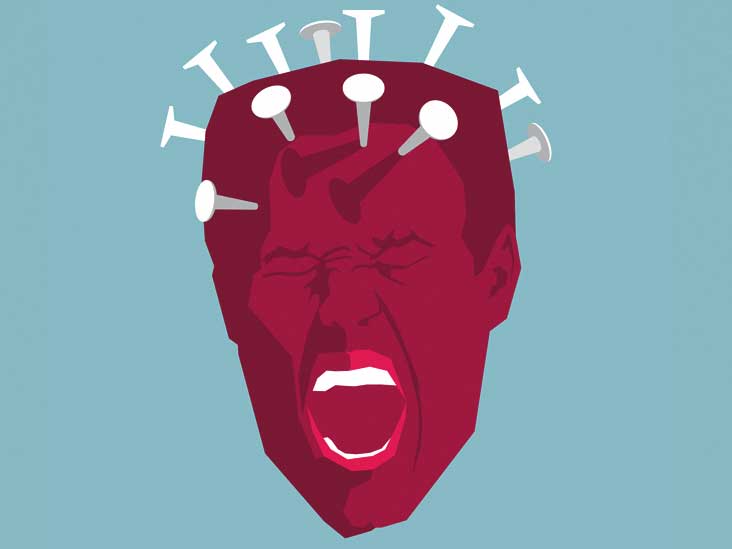Novel Breakthrough Migraine Drug Halves Length of Attacks
Migraines are characterised by an intense, throbbing headache, sensitivity to light and noise, nausea, vomiting, low energy, and visual disturbances. Attacks can last anything from four to 72 hours. Each year more than 8.5 million people in the UK are thought to experience migraine – more than the number affected by asthma, diabetes and epilepsy combined. The condition is linked to depression and sick days caused by migraine are estimated to cost the UK economy more than £2bn per year. One in seven Americans also suffers from migraines, and medications currently prescribed to prevent them—like blood-pressure drugs and antidepressants—don’t work for many people.
And scientists are now drawing closer to developing new breakthrough drugs that could not only quell migraines when they hit, but prevent them from happening in the first place.
A new drug called erenumab is found to reduce the length of migraine attacks by up to 50 percent in some people. This looks promising for those who are suffering from migraines that affect about 12 percent of children and adults in the United States.
For the last few years there has been major work examining the role of the calcitonin
gene-related peptide (CGRP) in activating migraines. Research has clearly shown that CGRP contributes to the pain conditions of a migraine, so scientists have been working on developing treatments that block the key CGRP receptors in the brain.There are currently four separate monoclonal antibody treatments being developed that target this mechanism and three of those drugs are already undergoing Phase III human clinical trials. One of first drugs to fully report Phase III results is called erenumab.
The study, labeled STRIVE (aka: Study to Evaluate the Efficacy and Safety of Erenumab in Migraine Prevention, NCT02456740), is reporting successful results both in efficacy and safety of the drug. Subjects receiving the full dose of erenumab reported a 50 percent reduction in monthly migraine days compared to the placebo group that reported only a 26.6 percent reduction.
The research on erenumab was carried out by researchers from King’s College Hospital in the UK, the Universitätsmedizin Berlin in Germany, St Göran Hospital in Sweden, the Medical University of Innsbruck in Austria, Mercy Research, and the pharmaceutical company Amgen in the US.
It was published in the peer-reviewed New England Journal of Medicine. The study was funded by Amgen and Novartis, pharmaceutical companies co-developing the drug.
Erenumab is a specially-designed protein made in the lab and deployed via injection into the immune system to target specific molecules known to affect migraines. It’s a type of monoclonal antibody, which are lab-made versions of proteins the immune system uses to target different substances in the body.
The study included 955 patients, divided into three groups: the first received 70 mg of erenumab, the second got a 140 mg dose, and the last were given a placebo. Both dosages seemed to work. The study reports that 43.3% of the 70-mg group and 50% of of 140-mg erenumab group saw their monthly migraines drop about 50%.
At study baseline, participants experienced an average of 8.3 migraine days per month. The team assessed how erenumab treatment affected the number of monthly migraine days at 4, 5, and 6 months after the first injection.
Additionally, the team found that those who received either dose of erenumab showed significant improvements in physical impairments caused by migraine, as determined by their scores on the physical-impairment and everyday-activities fields of the Migraine Physical Function Impact Diary.
Lead investigator Prof Peter Goadsby, from King’s College hospital, London, said: “Strive … represents an incredibly important step forward for migraine understanding and migraine treatment. The results of Strive represent a real transition for migraine patients from poorly understood, re-purposed treatments, to a specific migraine-designed therapy.”
Dr. Goadsby says that the study results “clearly show” that blocking the CGRP pathway is a feasible strategy for preventing migraine attacks and reducing their severity.
Simon Evans, chief executive of the charity Migraine Action, said: “Migraine is too often trivialised as just a headache when, in reality, it can be a debilitating, chronic condition that can destroy lives. The effects can last for hours, even days in many cases.”
“An option that can prevent migraine and that is well tolerated is therefore sorely needed, and we hope that this marks the start of real change in how this condition is treated and perceived.”




























.jpg)



